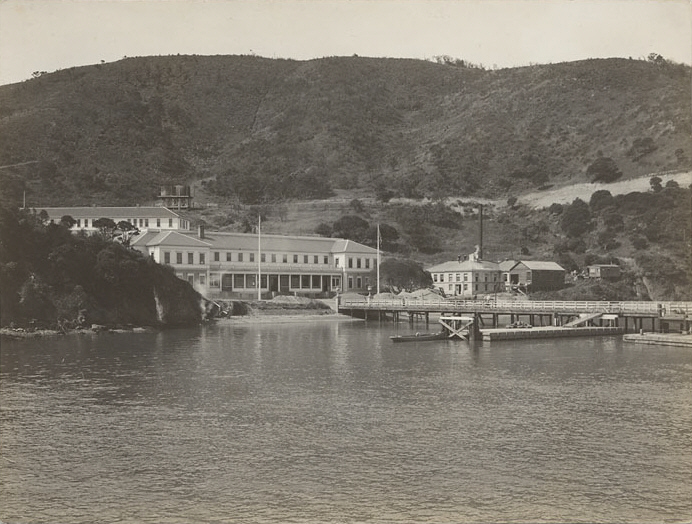"The Chinese Exclusion Act." As the Chinese sought higher wages, and as the economy went on the downturn, society began to turn against the Chinese minority, labeling them as a "Yellow Peril." For example, in 1877, Indiana Senator Oliver P. Morton wrote that "if the Chinese in California were white people I do not believe that the complaints and warfare made against them would have existed," revealing the way race plays a factor in the way society functions to exclude minorities such as the Chinese. In 1882, the Chinese Exclusion Act was passed as a response to popular political pressure to prohibit entry to Chinese laborers.
"Angel Island." As a result of the Chinese Exclusion Act, Angel Island Immigration Station, built on the largest island in the San Francisco Bay, opened its doors on 1910. Immigrants, the majority of which were Chinese, were subject to humiliating medical exams and grueling interrogation sessions that often lasted days.
Angel Island emerges as a symbol of the oppression that the Chinese faced in the United States, and reveals a broader narrative of how US society resisted immigration, excluded minority cultures, and tried to maintain their racial purity.

I find it interesting that on one hand the United States is a nation built off of immigrants to the New World, yet has such a long and somewhat dirty history of nativism and racism. Furthermore, I wonder if the motivations behind the Chinese Exclusion Act were mostly economic or cultural. There are certainly elements of both, but it seems that the reason these movements could gain ground was because of their appeal to the common voter. This applies today. In a two party system with limited options, voters might vote for the economically more beneficial option for them, despite perhaps opposing their morals.
ReplyDeleteThank you for shining a light on this topic. It's really tragic see how the U.S., a country built on unity, acceptance, and immigration, can be so hypocritical and against foreigners. Despite all these tragedies that the Chinese had to face once they came to America, it would be interesting to see the different methods that they used to cope with the discrimination and preserve their culture. One of the most lasting methods was the establishments of Chinatowns, which helped communities of Chinese immigrants band together and support each other. We live so close to the one in San Francisco, yet we think little of the history that is in the community. For more information on San Francisco's Chinatown and its assistance with Chinese immigration, go to: http://bancroft.berkeley.edu/collections/chineseinca/sfchinatown.html
ReplyDelete